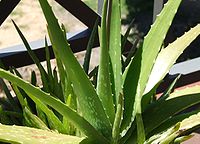Aloe vera is a medicinal plant that has been used for centuries. You might be aware of its benefits for sunburns, but there are many other documented uses of aloe vera gel. It contains at least seven antioxidant compounds that can be anti-inflammatory and promote healing.
Aloe juice can also be used as a supplement to treat heartburn and even ulcerative colitis. It is available in capsule form to help with constipation problems. Keep reading to learn about many other uses of aloe vera plant, including natural skin care.
Aloe Vera plant
Historically, Aloe’s medicinal properties date back to an Egyptian document written around B.C.E. 1550. The document listed twelve formulas containing Aloe to treat both internal and external disorders.
More recently it is being looked at for food preservation as researchers in Spain have found it can be used as an edible coating on fruits and vegetables. This would be extremely beneficial as well as environmentally friendly as most produce is sprayed with synthetic preservatives after harvesting. Researchers dipped grapes into aloe vera gel and successfully stored them for five weeks at low temperature. The untreated grapes under the same conditions deteriorated within one week. It is believed that the gel primarily works by acting as a natural barrier to moisture and oxygen. But it also appears to contain antibiotic and antifungal compounds that can inhibit microorganisms responsible for food-borne illness. On a more unusual note, it is being used for semen preparation for the artificial insemination of sheep.
Aloe has little standing in the world of medicine but most people are familiar with its healing potential for burns when applied topically to the skin. It is also a common ingredient found in thousands of cosmetic, hair care and skin care items.
Are you looking for natural skin care tips for your skin? Aloe vera gel is included in many natural skin care products to protect and heal your skin. Nice and soothing tonic for the evening use can be made by mixing aloe with honey and applying it to your face before going to bed. It’s especially helpful for oily skin that’s prone to acne because of its antibacterial properties.





